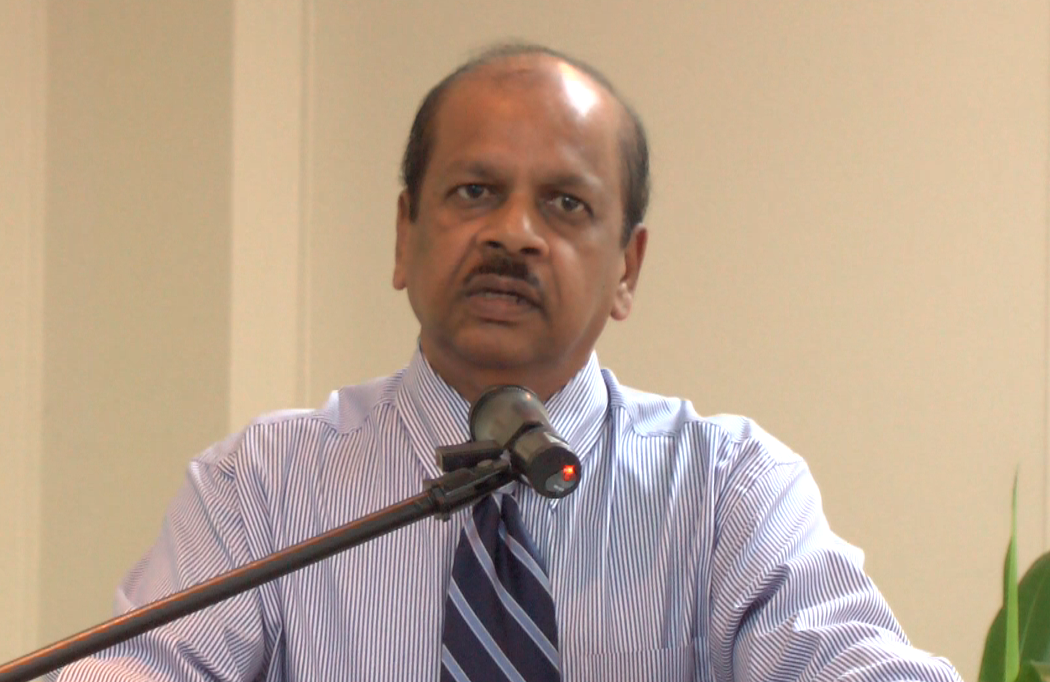As the Caribbean continues to grapple with effects of foreign banks, particularly those of the United States, severing ties with regional financial institutions, Guyana was “hard hit” by the de-risking phenomenon.

De-risking is the limiting or termination of correspondent banking relationships with indigenous banks because of fears of money laundering and questionable sources of funds which would cause the international banks to receive heavy fines from their regulators.
At a press conference on Thursday, Bank of Guyana (BoG) Governor Dr Gobind Ganga explained that this phenomenon has had and continues to have noticeable consequences in the financial services across the globe, particularly in developing states.
He explained that while foreign-owned banks operating in Guyana have not been subjected to de-risking, locally owned institutions have been hard hit by de-risking, losing collectively close to 37 per cent of correspondent relationships at the end of June this year.
However, Dr Ganga noted that the affected banks were able to partially fill that gap.
“Thus far, the two affected local banks were able to establish new correspondent relationships to cover about 75 per cent of those relationships that were lost. Each bank has at least one correspondent bank and we are working with the banks to establish other correspondent banks,” he stated.
Moreover, the governor pointed out that a major concern with the spate of de-risking is that legitimate transactions may go underground hence encouraging the use of cash and increase other informal means. The end result, he outlined, is likely to undermine the efforts to supervise and regulate the financial sector, fight money laundering and combat the financing of terrorism.
Caribbean banking institutions rely on correspondent relationships to allow residents to conduct international financial transactions. However, since last year, the Region has been facing the impact of de-risking and the issue has been occupying the attention of regional policymakers.
To this end, the Caricom Central Bank Governors establish a Technical Working Group on De-Risking which is tasked with preparing a position that will inform a Caribbean perspective on this matter.
Following the completion of its work, the group posited several recommendations among which was that Global regulators and international standard setters need to address the complexity of regulations and risk exposés which are contributing to biases in the incentive structure against certain classes of business.
According to the BoG Governor, Guyana has since enhanced compliance with the implementation of recommendations by the Financial Action Task Force (FATF) and the Financial Stability Board. He added too that along with Caricom counterparts and other financial institutions, Guyana continues to advocate with commercial banks in the United States of America and other countries to determine an appropriate way forward.
A few months ago, the Bank of America severed ties with indigenous banks here. At the time, July, Dr Ganga had disclosed that the BoG is in talks with several new international banks from both the United States of America and Europe that are interested in offering their services to Guyana following the Bank of America pull out.
De-risking in the Caribbean came into the limelight last year when the Belize Bank was cut off by the Bank of America and one of the two banks in Montserrat shared the same fate.
Some areas that are affected because of de-risking are: transfers of remittances, cheque payments, international trade, and the facilitation of credit card settlements for local clients.
The Caribbean Development Bank (CDB) quoted a November 2015 World Bank survey as saying that about 75 per cent of international banks have experienced a reduction in correspondent banking services with the Caribbean being the worst affected.
Discover more from Guyana Times
Subscribe to get the latest posts sent to your email.










